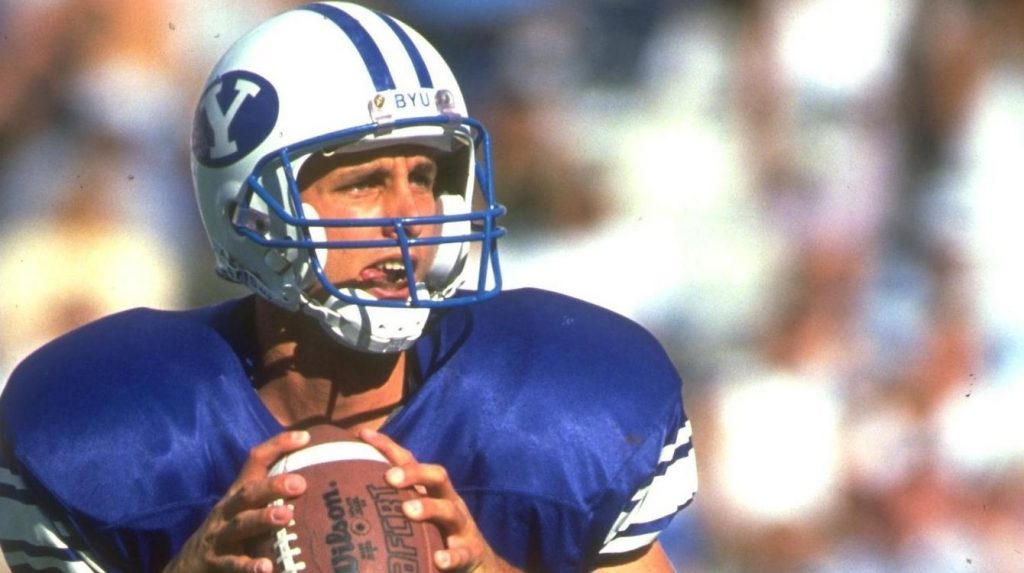
25th anniversary Heisman winner: Ty Detmer

Brigham Young University experienced of the most successful runs in college football history between 1979 and 1990. During those 12 years, the Cougars under LaVell Edwards went 123-31 and won a one national title. At the same time, five different BYU quarterbacks placed in the top five of the Heisman vote a remarkable seven times. The Cougar offense was unstoppable in those days thanks to a quarterback tradition that stretched back to Gifford Nielsen and Marc Wilson in the 1970s and continued on carried on with Jim McMahon, Steve Young and Robbie Bosco into the 1980s.
It was toward the end of that run, however, that the greatest of those quarterbacks emerged, winning the school’s only Heisman Trophy to date after a record-setting season in 1990.
Ty Detmer came to BYU by way of San Antonio, Texas, where he was an all-state performer at Southwest High School. Like so many Cougar quarterbacks in those days, he was a fierce all-around competitor, earning letters in golf, football, basketball, baseball, and track. As a senior in 1986, Detmer won high school All-American honors in football and was the Texas Player of the Year.
After his graduation, Detmer wanted to attend a college where he could throw the ball all over the field. In those days, no school threw the ball quite like BYU, so Detmer committed to Coach Edwards as a senior in high school. At 6 feet-0, 189- pounds, he wasn’t quite the prototypical BYU signal caller, but his uncommon competitiveness stood out.
After redshirting the 1987 season, Detmer served as a key backup as a 1988 redshirt freshman. By 1989, the starting job was all his. He emerged as one of the top quarterbacks in the nation, passing for 4,560 yards and 32 touchdowns during the regular season. His passer rating of 175.6 led the NCAA, and he finished second to Houston’s Andre Ware (the 1989 Heisman winner) in total offense. He led BYU to a Western Athletic Conference championship and finished ninth in the Heisman Trophy voting.
Not bad for a first-time starter, but it was just the beginning. Detmer captured the imagination of the college football world in 1990 thanks to a record-setting season that still resonates in Heisman history. The highlight of that season came in the second game, when defending national champion Miami came to Provo. The Hurricanes were loaded with talent and featured names like defensive tackle Russell Maryland, wide receivers Randall Hill and Wesley Carroll, and linebacker Darrin Smith. Few experts gave the Cougars–a 13.5 point underdog—any chance of winning the game. But BYU had the support of a record crowd of 66,235, some of whom wore blue “ties” as a way to promote Detmer for the Heisman. As it turned out, Detmer was magic that night.
The junior completed 38-of-54 passes for 406 yards against the Hurricanes, with one interception and three touchdowns. He was sacked a couple of times and knocked down even more, resulting in a gash to his chin that later required six stitches. But Detmer kept coming back, bedazzling the Miami defense on numerous occasions, dropping seemingly impossible passes into the side pockets of his receivers. When the dust cleared, the Cougars had won a 28-21 victory in front of a national television audience and Detmer was suddenly a household name. The BYU crowd celebrated raucously as it rushed the field.
“The win over Miami in Provo is a game people still come up to me and talk about,” Detmer said later. “It was exciting, perhaps one of the most exciting I’ve played because of who they were—ranked No.1 at the time and defending national champions… You can’t describe the feeling of being in that intense game, putting everything you have into it, then coming out with a win.”
In addition to winning over the fans, Detmer also earned the respect of the opposing team’s coach.
“Ty Detmer, to me, is unbelievable,” Miami coach Dennis Erickson said. “He made some great plays and throws with pressure in his face. Obviously, he’s a great, great quarterback, and he showed it tonight.”
Heisman voters took notice, too. As Detmer’s season progressed, it became clear that he was the leading candidate to take home the trophy. It was hard to argue with his numbers, as Detmer passed for 5,188 yards and 41 touchdowns in 12 regular season games and finished the year with 42 NCAA records. His 5,022 yards of total offense is still a Heisman record.
For his efforts, Detmer was awarded BYU’s first Heisman, totaling 1,482 points to beat out Notre Dame’s Raghib Ismail (1,177 points) and Colorado’s Eric Bienemy (798). He was the third-consecutive junior to win the Heisman and 10th overall. He was also the first collegian from the Rockies to receive the award.
“Winning the Heisman was a great honor,” said Detmer. “There have been a lot of great players, like my teammates and previous BYU quarterbacks, that contributed to it. They opened the door. It shows the strength of the program at BYU.”
Detmer returned for his senior season and had a good chance to join Archie Griffin as the only two-time Heisman winner. As a 1991 senior, he passed for 4,031 yards and 35 touchdowns and made it back to New York as a finalist, but he placed third in a vote won by Michigan’s Desmond Howard.
By the time his career was through, Detmer had 59 NCAA records under his belt, including 15,031 passing yards, 121 touchdown passes, 14,665 yards of total offense and a 162.7 passer rating.
Detmer was a ninth-round pick by the Green Bay Packers and ended up playing 13 years in the NFL, mostly playing as a highly respected backup signal caller.
Twenty-five years after his Heisman triumph, Detmer is still remembered for being the ultimate BYU quarterback, the David who slew the Miami Goliath and is considered one of the greatest passers in the history of college football.




